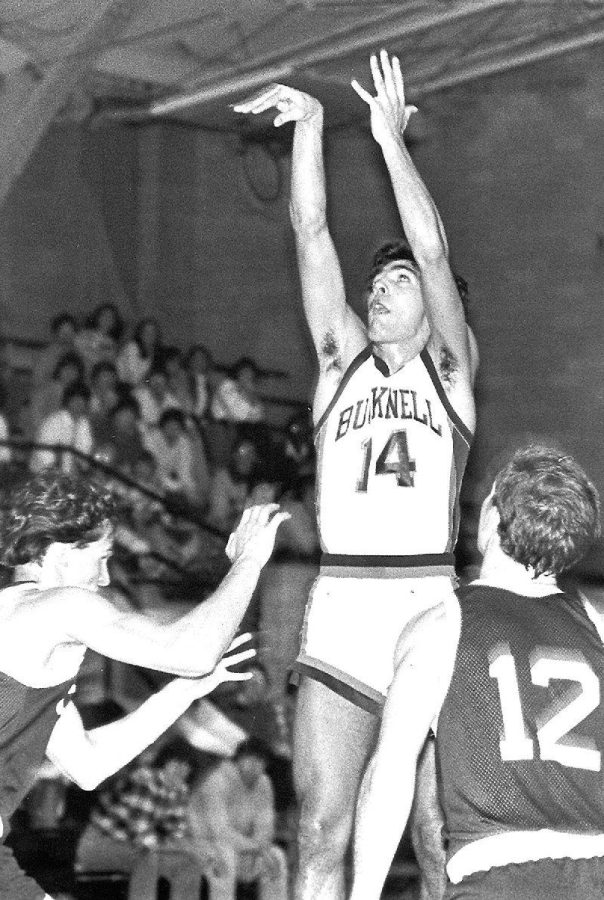Looking Back at Jay Wright’s Time as a Bucknell Point Guard
Jay Wright (above) during this playing time at Bucknell.
April 23, 2022
If people are asked who Jay Wright is, the answer will most likely reference his Hall of Fame coaching career with his two national championships, four Final Fours, five Big East Tournament championships and eight Big East regular season titles. One thing’s for sure, though: not many people would reference Wright, the college basketball player.
Prior to starting his coaching career at Division III Rochester as an assistant in 1984 and becoming a head coach at Hofstra and Villanova, where he compiled a 642-282 record, Wright took to the hardwood at Bucknell from 1979-83 after graduating from Council Rock North High School. It was with the Bison where Wright showed one day he could be a coach, starting with proving himself as a blue-collar player in his time at Bucknell.
“He did a lot of the fundamental things very well,” Chuck Curley, who covered Wright at Bucknell as a sports editor for the Standard-Journal in Milton, PA, said. “He wasn’t particularly flashy. He didn’t make a lot of mistakes, either.”
Under Wright, Villanova had impeccable fundamentals, as fans have been treated to the mastery of the pump fake, which consistently draws fouls or gets opposing defenders to fly by a three-point shooter, and unselfishness, as his players consistently make the extra pass to a teammate. The desire to take a charge to earn another offensive possession is another crucial fundamental his teams have done so well.
Another ability for a winning head coach to possess is to understand every players’ role on the team and how to use them properly. Wright certainly knows varying roles well because he carried out many roles on the Bucknell team.
“As a sophomore, he was simply a guy off the bench,” Curley said. “Then, he became the man. He became the leading scorer as a junior, so he knows what that’s like, and then, he got hurt. His last year, he came off the bench, so he knows what the sixth man feels like.”
In Wright’s sophomore year, he averaged 2.5 points per game, but as a junior, sky rocketed his production to average 11.9 ppg, 2.9 rebounds, 2.1 assists and 1.5 steals per game. In addition, Wright was named the team M.V.P. The 6-foot-3 guard got hurt before his senior year and was passed by one of Bucknell’s all-time leading scorers, Jaye Andrews, for the starting job, cutting his points per game average down to 3.7.
“He had a range of what every role on a basketball team should probably be, so he can sort of relate to every one of those roles, and treat those players accordingly,” Curley said.
Despite losing his starting job, Wright learned a valuable lesson of character and leadership: life is not all about how good of a basketball player one can be or what the wins and losses by his name are. During his time at Bucknell, Wright was ultra-competitive and thought he should be the starter after Andrews replaced him. It took him a while, but he assumed his role of leadership.
Andrews called Wright “a model teammate,” according to Bucknell, and said, “his leadership on the team was superb.”
Another aspect Wright took with him from his time at Bucknell was the recruiting of then-head coach for Bucknell, Charles Woollum. Recruiting for Bucknell was akin to recruiting for an Ivy League school because the player’s grades had to be high and Division I talent must be there. Wright recruited intelligent, highly skilled players to lead his teams with unity at an academically prestigious university in Villanova. Most importantly, Wright taught his players to be well-rounded young men who can take life skills away from the team into the real world.
“No matter what happened to Villanova, you could tell that they were united either in the victory or in the loss, and it also was not the most important thing in life to either win or lose a basketball game,” Curley said.
A final aspect Wright emulated in his Villanova teams from the Bucknell teams was solid shooting. The best teams Bucknell had were incredible shooting teams, and Wright’s time at Bucknell showed him the worth of consistently good shooting.
“That’s where Villanova’s been succeeding all these years,” Curley said. “They shoot the ball remarkably well.”
When someone mentions Jay Wright they will almost always talk about his coaching career, as they should, but his time at Bucknell had no shortage of influence in making Wright a Hall of Famer.


